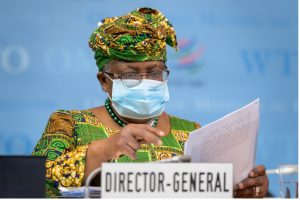By: Rishav Shah
Impunity Watch Staff Writer
WASHINGTON D.C., United States – As governments around the globe scale up vaccination efforts amid the COVID-19 pandemic, the international community is grappling with the convergence of “vaccine nationalism” or “hoarding” and intellectual property rights resulting in gross disparities in access to vaccine supply between upper and lower-income countries.

On February 5th, 2021, the World Health Organization (WHO) announced that three-quarters of the current vaccine supply has been secured and administered by 10 countries that account for 60 percent of global economic growth, while 130 countries- home to 2.5 billion people- had not received a single dose.
The potential emergence of a “vaccine apartheid” has prompted member states of the World Trade Organization (WTO) to debate the means by which to boost global vaccine access.
On October 2nd, 2020, South Africa and India submitted a proposal to suspend the WTO’s agreement on Trade-Related Aspects of Intellectual Property Rights (TRIPS) for the duration of the pandemic. The effect of the proposal would be a temporary intellectual property waiver on technology, drugs, and vaccines related to the pandemic. By temporarily waiving intellectual property rights with respect to COVID-19 specific equipment, drugs, and vaccines, the proposal seeks to facilitate the transfer of technology and scientific knowledge to developing countries with the goal of ramping up global production of vaccines and increasing access beyond just the wealthiest nations.
At issue before the WTO is the larger question of whether vaccines should be treated as market commodities, or public goods.
Since October, support for the proposal has gained momentum, with all 57 members of the African Union at the World Trade Organization signing on as co-sponsors. In addition, 31 U.S. lawmakers have expressed support for the waiver, along with 115 members of the European Parliament. Notably, in February 2021, more than 400 organizations in the United States called on President Biden to endorse the waiver.
A number of high-income countries in which large pharmaceutical companies exert substantial political influence, including the United States, the United Kingdom, Canada, Australia, Switzerland, Japan, and Brazil, have argued against the waiver. This opposition is based on the argument that any waiver of patents would deter private investment, thus hampering scientific innovation. In addition, these countries contend that existing WTO regulations like the Doha Declaration of 2001 allow pharmaceutical companies to negotiate bilateral agreements with generic manufactures in order to tackle public health emergencies.
Supporters of the proposal disagree with the notion that the waiver would hamper scientific development, noting that large pharmaceutical companies received close to 10 billion USD in public funds and non-profit funding for their vaccine candidates. Their position is that the waiver will give governments of the global south an opportunity to pursue mass vaccine manufacturing by tapping into unused or under-used factories and facilities in their respective countries or anywhere in the world, instead of being priced out of vaccine purchase agreements with pharmaceutical companies
The Director-General of the WTO, Ngozi Okonjo-Iweala, has come out strongly against vaccine nationalism but is yet to endorse the proposal set forth by India and South Africa. She has articulated a “third-way” approach whereby large pharmaceuticals license manufacturing to countries in order to increase vaccine supply without compromising intellectual property rights. This approach would leave control over production limits with large pharmaceutical companies.
Some of the countries in opposition to the waiver-Canada, Australia, Switzerland, Japan, and others- have pledged to donate financial resources and surplus vaccines to the UN-backed COVID-19 Vaccines Global Access Facility (COVAX). COVAX is a program designed to boost the distribution of vaccines to low-income countries. While donations to COVAX will improve vaccine access, COVAX aims to vaccinate only 20% of every participating country’s population. This is far from what is needed to achieve herd immunities in lower-income countries that are relying heavily on COVAX as their primary vaccine distributor.
In the months since the impasse at the WTO, another 2.65 million people have succumbed to the virus globally. The wealthy countries in opposition to a temporary suspension of the TRIPS agreement have made their case in favor of private enterprise, but are yet to outline an approach that would remedy the issue of vaccine hoarding and curb the spread of COVID-19 in countries with limited access to the vaccine. The decision to treat a vaccine that has been largely subsidized by taxpayer money and public funds as a private market commodity– rather than a public good– will have unconscionable human rights implications. Without the temporary suspension of the WTO TRIPS agreement allowing poorer nations to produce the vaccines widely, the vast majority of the global vaccine supply will remain disproportionately concentrated in the world’s wealthiest countries, leaving lower-income countries to be ravaged by mass fatalities from the virus.
For further information, please see:
Al-Jazeera – Patently Unfair: Can Waivers Help Solve Vaccine Inequality? – 1 Mar. 2021
Euronews – Rich countries must stop ‘vaccine apartheid’ – 11 Mar. 2021
Foreign Policy – Rich vs. Poor (Again) at WTO – 10 Mar.2021
Reuters – Incoming WTO head warns ‘vaccine nationalism’ could slow pandemic recovery – 15 Feb. 2021